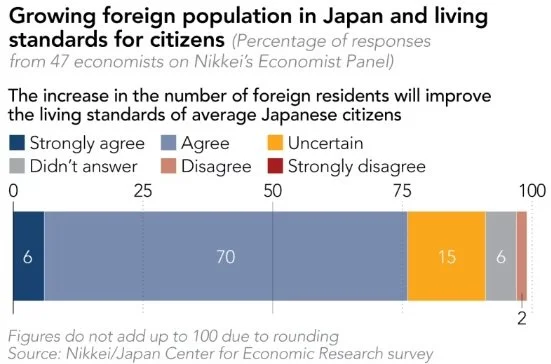Labor shortage in Japan and what that means for you Part 6: Foreign workers on the rise
This is the final installment in the series, and it lands at a pivotal moment.
Japan’s labor market is undergoing a quiet but significant transformation. In a recent Nikkei/Japan Center for Economic Research survey, 47 economists were asked whether the growing number of foreign residents would improve living standards for average Japanese citizens. The response was clear: an overwhelming majority, 76%, said yes. This signals not just economic optimism, but a broader shift in how Japan views the role of foreign workers in its future.
76% of economists agreed or strongly agreed that foreign workers are contributing positively to Japan’s social and economic fabric. Only 8% disagreed, and 15% remained uncertain. This signals a growing recognition that foreign labor isn’t just a stopgap, it’s part of Japan’s long-term strategy to address its demographic challenges.
What This Means for You
If you’re considering working in Japan, this shift could work in your favor. Here’s how:
1. Increased Demand Across Sectors
Japan’s aging population and shrinking domestic workforce mean that industries like caregiving, agriculture, hospitality, and construction are actively seeking foreign talent. If you have experience or certifications in these areas, your skills are in demand.
2. Positive Public Sentiment
The survey results suggest that economists, and by extension, policymakers and employers, are increasingly supportive of foreign workers. This can translate into more inclusive hiring practices, better support systems, and a more welcoming environment overall.
That said, Japan is not monolithic. The recent rise of the xenophobic Sanseito party reminds us that not all voices in Japan are aligned with this openness. However, their success does not reflect the views of the majority. The growing support among economists and many regional leaders signals that Japan is, in many ways, moving toward a more pragmatic and inclusive approach to immigration and foreign labor.
3. Opportunities Beyond Tokyo
While major cities still dominate the job market, regional areas are becoming more open to hiring foreign workers. These communities often offer unique cultural experiences and a lower cost of living, though they may require stronger Japanese language skills.
4. Long-Term Career Potential
Japan is not just looking for short-term labor. Companies are beginning to invest in training, career development, and retention strategies for foreign employees. If you’re serious about building a career in Japan, now is a promising time to start.
Bottom Line: The rise in foreign workers is not just a trend, it’s a shift in mindset. Japan is opening up, slowly but surely. And if you’re prepared, linguistically, professionally, and culturally, you could be part of this new chapter.
If you are interested in working for a Japanese company abroad or in Japan itself, and especially if you speak some Japanese, this means you have better prospects than ever before. If you want to prepare for such a job, why not get some additional training!
Want to know more? At Japan Consulting Office, we specialize in equipping professionals to thrive in cross-cultural environments. Whether you’re looking for group training or one-on-one sessions, we’ve got you covered!
If you want to learn more about bridging language and cultural gaps in Japanese business, why not join one of our sessions! Here’s the link to upcoming sessions (make sure to select your timezone


